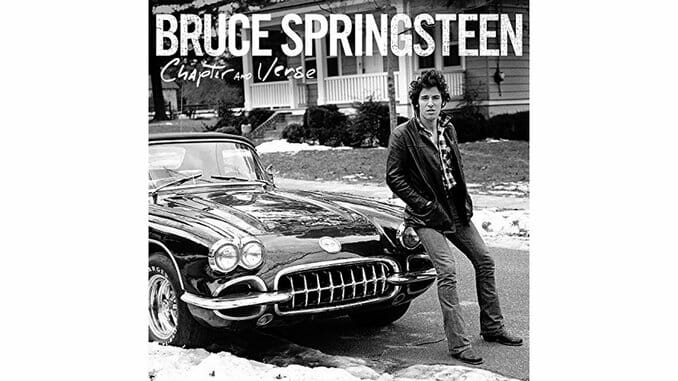
The phrase “soundtrack to our lives” gets tossed around a lot, but it’s a phenomenon most of us play a passive role in—other peoples’ music happens to us, impacts our lives, reflects our emotions or certain periods of time. But if you’re a musician, particularly one who’s enjoyed a career as long and successful as Bruce Springsteen’s, putting together the “soundtrack of your life” isn’t just an act of curation; it’s autobiography.
And so, on the Boss’ 67th birthday, we have Chapter and Verse, the companion album to his forthcoming memoir, Born to Run. This isn’t a greatest hits compilation—you won’t find “Thunder Road” or “Dancing in the Dark” or “Glory Days” or “Hungry Heart” here. Instead, we’ve got 18 tracks hand-selected by Springsteen to tell his story, tracing his musical history in chronological order.
If you’re more than a casual fan, you’ve probably already got a pretty good idea of what that entails, so what makes Chapter and Verse most enticing are the five previously unreleased tracks from early in his career. The album kicks off with “Baby I,” a 1966 cut from his teenage band, The Castiles, before going into their garage-rock cover of “You Can’t Judge a Book By Its Cover” and Steel Mill’s “He’s Guilty (The Judge Song)” from 1970. But the most noteworthy of these unreleased songs are the two where we can really hear Springsteen coming into his own as a songwriter. The Bruce Springsteen Band’s “Ballad of Jesse James” (recorded in 1972) asks “don’t you wanna be an outlaw, just a poor boy caught on the skids” and features a handful of E Street Band members (Danny Federici, Vini Lopez and Steven Van Zandt). Musically, it apes The Band a little, but the lyrics are pure Springsteen, and we get hints of the anthems he’d go on to pen. “Henry Boy” is, presumably, an early stab at “Rosalita”—the melody’s identical, but lyrically there are no big advances from the record company here, just a Jersey boy with broken toys.
The sequencing means that “Born to Run” lands beautifully; hearing it after listening to Springsteen’s early evolution as a songwriter is a nice reminder that it didn’t just change all of our lives—it changed his, too. It’s fascinating to go through Chapter and Verse’s latter half and see which tracks Springsteen himself considers to be watersheds or particularly indicative of his progress as a songwriter. Some are no-brainers (“Badlands,” “The River,” “My Father’s House,” “Born in the U.S.A.”), but others like 1992’s “Living Proof” (off of Lucky Town) and “Long Time Coming” (from 2005’s Devils & Dust) were perhaps included because of their autobiographical content—the former about the birth of his first child, the latter written through the eyes of a character but featuring themes of distant fathers and redemption (“my daddy, he was just a stranger”) that feel at least partly inspired by Doug Springsteen.
That’s ultimately what makes Chapter and Verse unique—it’s not necessarily the Springsteen songs that soundtracked our lives; it’s the ones that soundtracked his. It ends, perhaps slightly tongue-in-cheek, with “Wrecking Ball” (“Now when all this steel and these stories, they drift away to rust/And all our youth and beauty, it’s been given to the dust/When the game has been decided and we’re burning down the clock/And all our little victories and glories have turned into parking lots”), but we all know it’s nowhere near time to knock down and pave over the Boss. So instead we’ll savor it and wait patiently for the next chapter.
GET PASTE RIGHT IN YOUR INBOX
The best music, movies, TV, books, comedy and more.